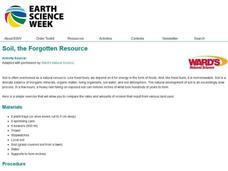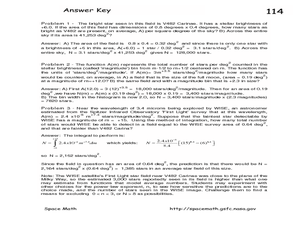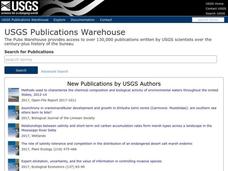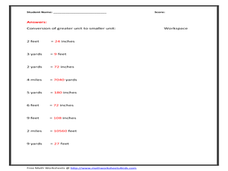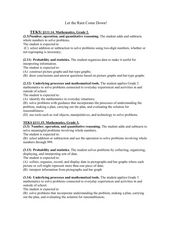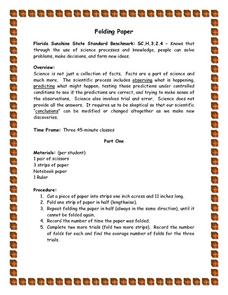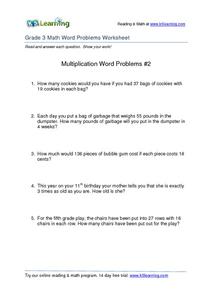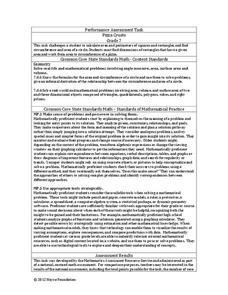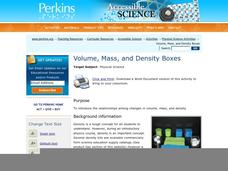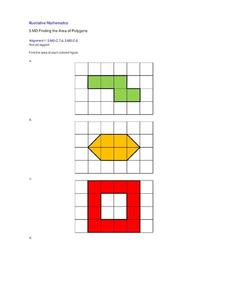Curated OER
Soil, the Forgotten Resource
Students discuss soil understanding that is is often overlooked as a natural resource. In this science instructional activity, students recognize that we depend on it for energy in the form of foods. Students experiment with six boxes of...
Curated OER
A Formula for SI Catch-Up
In this SI units learning exercise, students read about converting from SI units to non-SI units. They are given a conversion chart and they use it to convert from one unit of measurement to another in seven problems.
Curated OER
Exploring Power-Law Functions Using WISE Data!
In this power-law functions worksheet, students solve 3 problems using data from the Wide-field Infrared Survey Experiment in the constellation Carina. Students use a photograph to determine the number of stars as bright as the brightest...
Curated OER
Deep Jungle: New Frontiers
Students watch a series of videos and observe the different plants and animals found in the rainforests. In this ecology lesson, students discuss how technology helped scientists study the jungle. They create 3D maps of Borneo rainforests.
Curated OER
Map Scale
Third and fourth graders are introduced to the concept of map scale. Using an illustration, they discuss if it shows the actual size of the object and why scale is used to represent areas. They use some items in the illustration to...
Curated OER
US Metric Units -Length
In this metric unit length worksheet, students convert a set of greater units to smaller units. Answers are included on page 2.
Curated OER
Metrics
Students explore the metric system. In this science lesson plan, students familiarize themselves with the metric system as they participate in a hands-on activity.
Curated OER
Numeric Response Problem
In this square units worksheet, 3rd graders complete word problems about the amount of square units shown. Students complete 10 problems.
Curated OER
Salty Solutions
Middle schoolers measure salt content in water. They determine salt content of four samples using a hydrometer.
Curated OER
The Foot Book
Students use estimation and measurement skills to make predictions and solve problems about length. They also analyze data presented to calculate ratios and percents.
Curated OER
Multiplying Polynomials
Students explore the concept of multiplying polynomials. In this multiplying polynomials instructional activity, students watch a video clip about basic math skills. Students work in groups on an exploration about why a binomial squared...
Curated OER
Let the Rain Come Down!
Second graders construct a bar graph comparing local precipitation to that of the Yucatan. In this graphing lesson, 2nd graders will use conversions and problem solving strategies.
Curated OER
Age of Exploration: A Comprehensive Research Project
Fifth graders examine reasons for exploration, the outcomes, and various explorers. In this age of exploration lesson, 5th graders create a flipbook with timeline and images to showcase their knowledge.
Curated OER
How tall are you?
Students review different units of measurement that would be used to measure height. They compare their height to that of Abraham Lincoln by working with a partner to make a life size tracing of each other and measuring their height.
Curated OER
Metric Conversions Worksheet
In this metric instructional activity, students examine conversion factors for length, mass, volume and area. Definitions of prefixes and metric abbreviations are identified.
Curated OER
Scale Basketball
Learners discuss scale diagrams and maps as well as the use of spreadsheets to find the best scale to use in a model before practicing scale and ratio problems on their own.
Curated OER
Folding Paper
Young scholars use the scientific process and their knowledge to obeserve, predict, and test their predictions under controlled conditions to verify their predictions and then make sense of these predictions. They also graph, write...
Curated OER
Learning Lesson: A Pressing Engagement
Students complete experiments in which they discover the effect of the weight of the air above them. They use different weights of paper to complete the experiment. They also examine thunderstorm safety.
K5 Learning
Multiplication Word Problems #2
If your mom is three times older than you are, how old is she on your 11th birthday? Young mathematicians answer this and four other multiplication word problems using real-life scenarios. They consider bags of cookies, pounds of...
Noyce Foundation
Pizza Crusts
Enough stuffed crust to go around. Pupils calculate the area and perimeter of a variety of pizza shapes, including rectangular and circular. Individuals design rectangular pizzas with a given area to maximize the amount of crust and do...
PBS
Four Corners
It's imperative to be as precise as possible. Future engineers learn about precision by building a cardboard machine. The base, corners, handles, and paddles must all be assembled with precision or the machine won't work.
Perkins School for the Blind
Volume, Mass, and Density Boxes
Mass and density are difficult topics for kids to understand, and even more difficult when you have visual impairments or blindness. Learners will make boxes and fill them with cotton, sand, or crushed paper. They will feel the density...
Mathematics Vision Project
Module 6: Trigonometric Functions
Create trigonometric functions from circles. The first lesson of the module begins by finding coordinates along a circular path created by a Ferris Wheel. As the lessons progress, pupils graph trigonometric functions and relate them to...
Curated OER
Finding the Area of Polygons
Third graders are exposed to finding the area of polygons by decomposing figures and recomposing them into rectangles. This strategy allows children to expand on their prior knowledge of constructing shapes by rearranging parts into...


